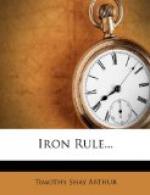“What shall I do with this boy?” said Mr. Howland. He spoke sternly, yet in a perplexed voice, while he walked the floor of the room with a quickness of tread unusual. “If something is not done to break him into obedience he will be ruined.”
“He needs all our forbearance,” Mrs. Howland ventured to remark, “as well as our care and solicitude.”
“Forbearance! I have no forbearance toward wrong, Esther. You have forborne until the child is beyond your control.”
“Not entirely,” was meekly answered, as the mother’s eyes drooped to the floor.
At this moment a servant, who had been sent for the child, came in with him. A few doors away lived another child, about the same age, of whom little Andrew was very fond, and whose companionship he sought on every occasion. Against the father of this child Mr. Howland had imbibed a strong prejudice, which was permitted to extend itself to his family. Rigid and uncompromising in everything, he had observed that Andrew was frequently in company with the child of this neighbor, and felt impelled to lay a prohibition on their intercourse. But Andrew, a light-hearted, high-spirited boy, who inherited from his father a strong will, was by no means inclined to yield a ready obedience in this particular. He loved his little companion, and never was happier than when in her society. Naturally, therefore, be sought it on every occasion, and when the positive interdiction of their intercourse came, the child felt that a duty was imposed upon him that was impossible of fulfillment. Young as he was, he could endure punishment, but not give up his little friend. Advantage was therefore taken of every opportunity to be with her that offered. Punishments of various kinds were inflicted, but they acted only as temporary restraints.
As to this little girl herself, let it be understood, Mr. Howland had no personal objection. He had never seen anything that was wrong in her, and had never heard a word of evil spoken against her. The simple, yet all-embracing defect that appertained to her was his dislike of her father; and this dislike had its chief foundation in a wrong estimate of his character, the result of his own narrow prejudices. Somewhat hastily, we will admit, did Mr. Howland utter the word that was to separate the little friends, and the word was half-repented of as soon as spoken. But once uttered, it was a law to which he required the most implicit obedience. He thought not of the wrong the separation might do his child; he thought only of enforcing obedience—of breaking a stubborn will. Obedience in children was, in his eyes, everything—and he visited, with the sternest displeasure, every deviation therefrom. The consequence was, that his little ones, in their nest at home, rarely saw in the face of their father a smile of affection; rarely heard his voice in words of tenderness. Something, in their conduct was ever displeasing to him, and he attempted its correction by coldness, repulsion, harsh words, or cruel punishment. He never sought to lead, but to force them into the right way.




